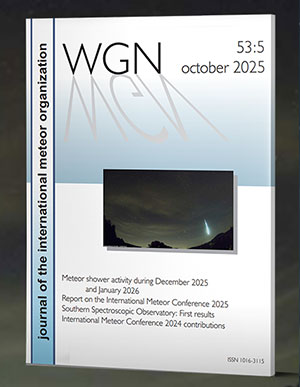An outburst of Draconid activity was observed from
Asian and eastern European geographical longitudes
on October 8, 2005. The activity was also observed
by radar technique with highest rates at a solar
longitude of 195.44 (2005 October 8, 17h UT). With
a population index of r=3.0, an equivalent ZHR near
150 was derived (Campbell-Brown et al., Univ. of
Western Ontario). Visual rates may be lower due to
the different range of larger masses causing visual
meteors.
[CSV]
Date (Oct),Solarlong,nINT,nGIA,ZHR,+-
06 19:20,193.5640, 4, 2, 2.0,1.1
07 16:00,194.4114, 2, 2, 4.1,2.4
07 18:50,194.5291, 5, 4, 2.5,1.1
08 14:10,195.3250, 2, 7,19.5,6.9
08 16:10,195.4026, 6,18,34.3,7.9
08 18:30,195.5016,10,49,15.3,2.2
08 19:50,195.5589, 8, 8, 4.0,1.3
08 21:50,195.6417, 8, 7, 3.7,1.3
09 07:10,196.0252, 4, 2, 2.6,1.5
[/CSV]
Solar longitudes refer to equinox J2000.0. ZHRs were computed with a population index of 3.0 in accordance with the radar ZHRs. No personal perception coefficients and no additional zenith correction apart from sin(hR) are applied.
We are grateful to the following observers sending in their data quickly:
Ricardas Balciunas (Lithuania), Jiang Chang-gui (China), Rong Chen (China), Audrius Dubietis (Lithuania), Bo Gao (China), Yandong Hu (China), Carl Johannink (Germany), Velislava Kiryakova (Bulgaria), Jens Lacorne (France), Ming-hui Liang (China), Xuan Liu (China), Jin Ma (China), Veikko Makela (Finland), Mikhail Maslov (Russia), Alastair McBeath (UK), Koen Miskotte (Netherlands), Markku Nissinen (Finland), Jurgen Rendtel (Germany), Svetlana Slavova
(Bulgaria), Valentin Velkov (Bulgaria)




 You saw something bright and fast? Like a huge shooting star? Report it: it may be a fireball.
You saw something bright and fast? Like a huge shooting star? Report it: it may be a fireball.  You counted meteors last night? Share your results with us!
You counted meteors last night? Share your results with us!  You took a photo of a meteor or fireball? You have a screenshot of your cam? Share it with us!
You took a photo of a meteor or fireball? You have a screenshot of your cam? Share it with us!  You caught a meteor or fireball on video? Share your video with us!
You caught a meteor or fireball on video? Share your video with us!